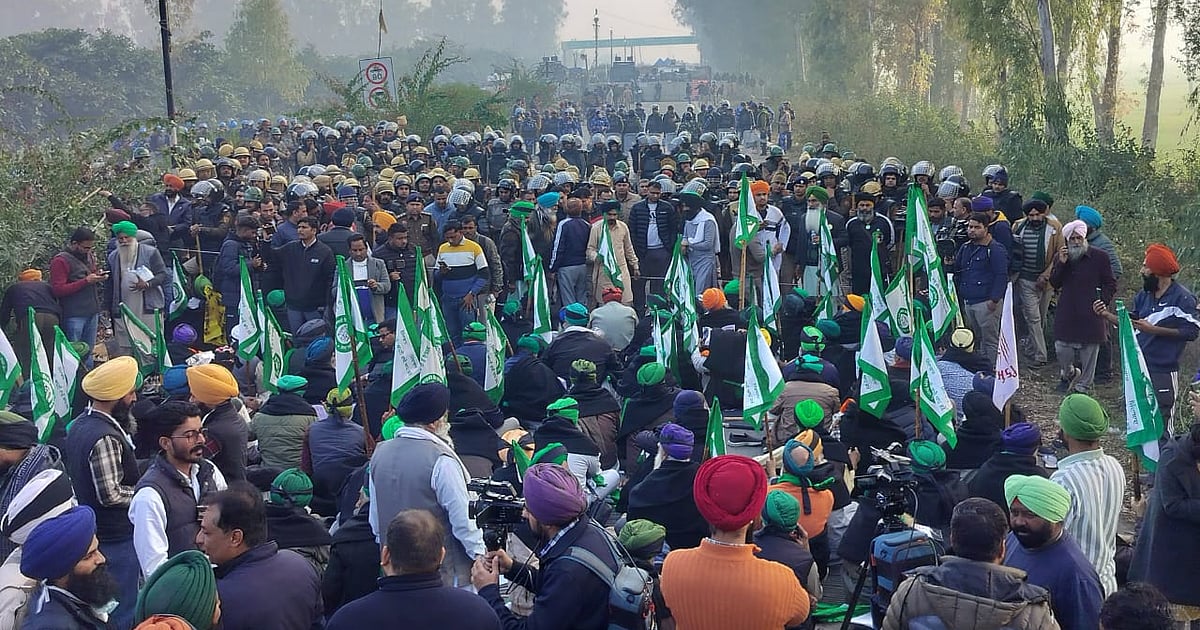 |
|
The ongoing farmers' protest in India has reached a critical juncture with the commencement of a fast-unto-death by 111 farmers in solidarity with Jagjit Singh Dallewal, who has been on a hunger strike for 51 days. This drastic escalation underscores the depth of farmers' frustration and their unwavering commitment to securing a legal guarantee on Minimum Support Prices (MSP) for their crops. The protest, taking place at the Khanauri border between Punjab and Haryana, highlights the simmering tensions between the protesting farmers and the Union government. The farmers, clad in black and carrying placards expressing their determination to sacrifice themselves for the cause, initiated their fast after prayers, symbolically cutting through barbed wire to reach their protest site. The dramatic visuals of the protest emphasize the urgency and desperation felt by the protesting farmers.
The deteriorating health of Jagjit Singh Dallewal, the convener of the Samyukta Kisan Morcha (Non-Political), serves as a catalyst for this extreme measure. His condition, marked by multi-organ failure and refusal of medical aid, has deeply affected his supporters. Doctors have reported a critical decline in his health, characterized by high ketone levels and significant muscle mass loss. This alarming situation has spurred the 111 farmers to initiate their own fast-unto-death, signifying their solidarity and determination to pressure the government into addressing their demands. The emotional toll on the farmers is palpable, with many expressing their willingness to sacrifice their own lives in support of Dallewal and the larger farmers' cause. This act of self-sacrifice underscores the depth of the crisis and the feeling among the protesting farmers that their voices are not being heard.
The Haryana police have deployed heavy security at the border, anticipating potential escalation of the situation. The farmers are being provided only with water and housed in a tent to shield them from the cold. While the Punjab government has deployed medical teams from Rajindra Medical College and Mata Kaushalya Hospital, Patiala, to monitor Dallewal’s health and has even established a makeshift hospital near the protest site, the severity of the situation remains evident. Farmer leader Abhimanyu Kohar has vehemently criticized the Union government for its inaction and unwillingness to engage in meaningful dialogue. He pointedly highlights the government's apathy towards the farmers' demands, portraying the situation as one of blatant disregard for the well-being of those who feed the nation. The prolonged protest and the now extreme measure of a fast-unto-death represent not only a challenge to the government's policies but also expose the severe socioeconomic vulnerabilities faced by many farmers in India.
The issue of Minimum Support Prices (MSP) lies at the heart of this protracted conflict. Farmers argue that a legal guarantee on MSP is essential for their economic survival and to protect them from volatile market fluctuations. The lack of such a guarantee leaves them vulnerable to exploitation and forces many to operate under unsustainable conditions. The current system, as it stands, leaves the farmers largely at the mercy of market forces, often resulting in devastating financial consequences. The government’s reluctance to address this core demand has fueled the intensity of the protest, pushing farmers to resort to extreme measures in the hope of finally being heard and their livelihoods protected. The scene at the Khanauri border, with its stark juxtaposition of resolute farmers and heavy security, serves as a powerful image of the ongoing struggle for farmer's rights and the desperate measures being employed to secure a just resolution.
The situation demands a careful and considered response from the government. Ignoring the farmers’ demands and failing to address their legitimate concerns will only serve to exacerbate the situation. The health risks involved in a fast-unto-death are extremely serious, and the potential for loss of life highlights the urgency of the situation. While the government may have its own rationale for its current stance, a constructive dialogue and a willingness to find common ground are essential. It is imperative that both sides work towards a peaceful resolution that addresses the core concerns of the farmers, ensuring their livelihoods and well-being are secured. The ongoing protest underscores the deep-seated anxieties and precarious situation faced by countless farmers, raising critical questions about agricultural policy and the need for broader social and economic reforms in rural India.
Source: On Dallewal's 51st day of protest, 111 farmers start fast unto death
